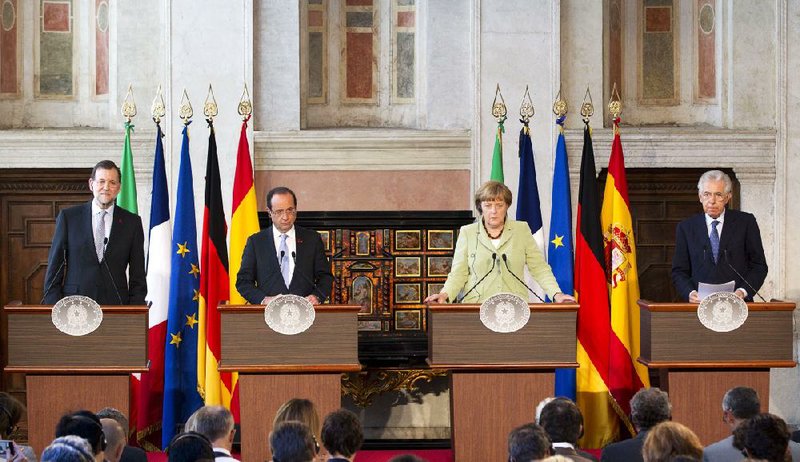LITTLE ROCK — A plan for European Union countries to tax financial transactions and use the proceeds to fund future bank bailouts ran aground Friday, with just 10 out of 27 countries prepared to support it.
The impasse over the proposal by the European Commission, the European Union’s executive body, highlights the difficulty of getting European politicians to agree on just one plan as they wrestle with the complex problem of containing the debt crisis that threatens to undermine the euro.
The proposed financialtransaction tax would charge banks 0.1 percent of the value of sales of stocks or bonds and 0.01 percent per derivative contract. Money raised by the tax would then be used to fund future bank bailouts. Some countries such as the Netherlands and the United Kingdom are vehemently opposed to the scheme.
George Osborne, the British chancellor of the exchequer, said such a tax would hurt the economies of countries that adopt it, as financial transactions will be rerouted to countries outside the union.
“I would have thought we want to be attracting business rather than the other way around,” he said.
However, finance ministers from 10 countries that endorsed the idea — including Germany, France, Spain, Greece, Poland, Italy and Austria — said they still wanted to forge ahead with the plan and hoped that some of the undecided countries would join them later.
German Finance Minister Wolfgang Schaeuble said he would have preferred all 27 EU member countries adopt the tax but he will still pursue it. “We emphatically want to move ahead,” he said.
“I will not allow this project to die,” Austrian Finance Minister Maria Fekter said.
After it became clear the plan would not be adopted by all, the debate ended without a clear result.
This is not the first time cracks have appeared in the European Union over its response to the financial crisis. In March, the so-called fiscal compact, which would introduce stricter requirements for national budgetary discipline, was signed by 25 EU countries — but not Britain and the Czech Republic. If the treaty is ratified, it will apply to those countries that ratify it rather than to all EU countries.
Meeting in Rome on Friday, the leaders of France, Germany, Italy and Spain provided few concrete details about their gathering beyond their agreement to pursue the financial-transaction tax.
President Francois Hollande of France, German Chancellor Angela Merkel, Spanish Prime Minister Mariano Rajoy and Italian Premier Mario Monti also agreed to push for a growth package worth up to $163 billion at a European Union summit next week aimed at kick-starting the economy and safeguarding the currency bloc.
“This [$163 billion] is a strong signal,” Hollande said after the Rome meeting. Hollande and Italy’s Monti have been pushing for a collectively financed stimulus plan.
The four leaders didn’t give specifics about the growth plan or how it would be financed.
“The package has a ‘shuffling of the deck chairs’ feel to it,” said Nicholas Spiro, managing director of Spiro Sovereign Strategy in London.
Perhaps the biggest breakthrough of the brief summit was Merkel’s acknowledgment that austerity alone won’t cure the euro’s woes. Merkel has come under increasing pressure to give ground on key progrowth measures.
“We say that growth and solid financials are two sides of a coin. Solid financials are not sufficient,” Merkel said.
Economists said the size of the proposed growth package is modest, about 1 percent of the euro alliance’s gross domestic product. But they said it marked a recognition by Merkel that more government spending is needed.
“It is at least a step in the right direction,” said Ted Truman, a former international economics adviser at the Federal Reserve and at the Treasury Department in the Obama administration. “The tone has changed, in part because the German economy has not been doing as well recently.”
Monti, who met with his fellow leaders at a government villa in Rome, is trying to build a bridge between Merkel’s insistence on fiscal discipline and the focus on growth by recently elected Hollande. He acknowledged that steps taken so far have not been sufficient, and that markets and European Union citizens alike need to view the euro currency as “irreversible.”
“We maintain that if four countries as important and diversified as ours can find a convergent line, this can help force a strong consensus at the EU council,” Monti said during a closing news conference.
Monti has warned of severe consequences for the 17 countries that use the euro and the world economy if next week’s summit fails.
“A large part of Europe would find itself having to continue to put up with very high interest rates; that would then impact on the states and also indirectly on firms. This is the direct opposite of what is needed for economic growth,” Monti said in an interview with six European newspapers published Friday.
Without a successful outcome at the summit “there will be progressively greater speculative attacks on individual countries, with harassment of the weaker countries,” Monti said.
Information for this article was contributed by Don Melvin, Toby Sterling, Colleen Barry and Francis D’Emilio of The Associated Press and by Andrew Frye, Patrick Donahue and Chiara Vasarri of Bloomberg News.
Front Section, Pages 1 on 06/23/2012

